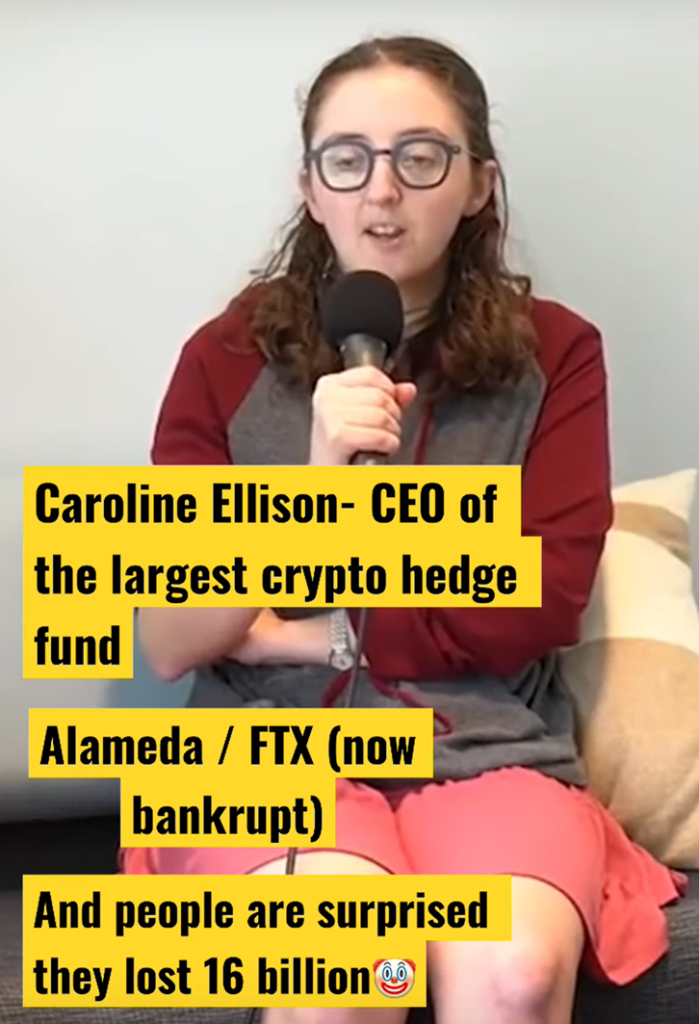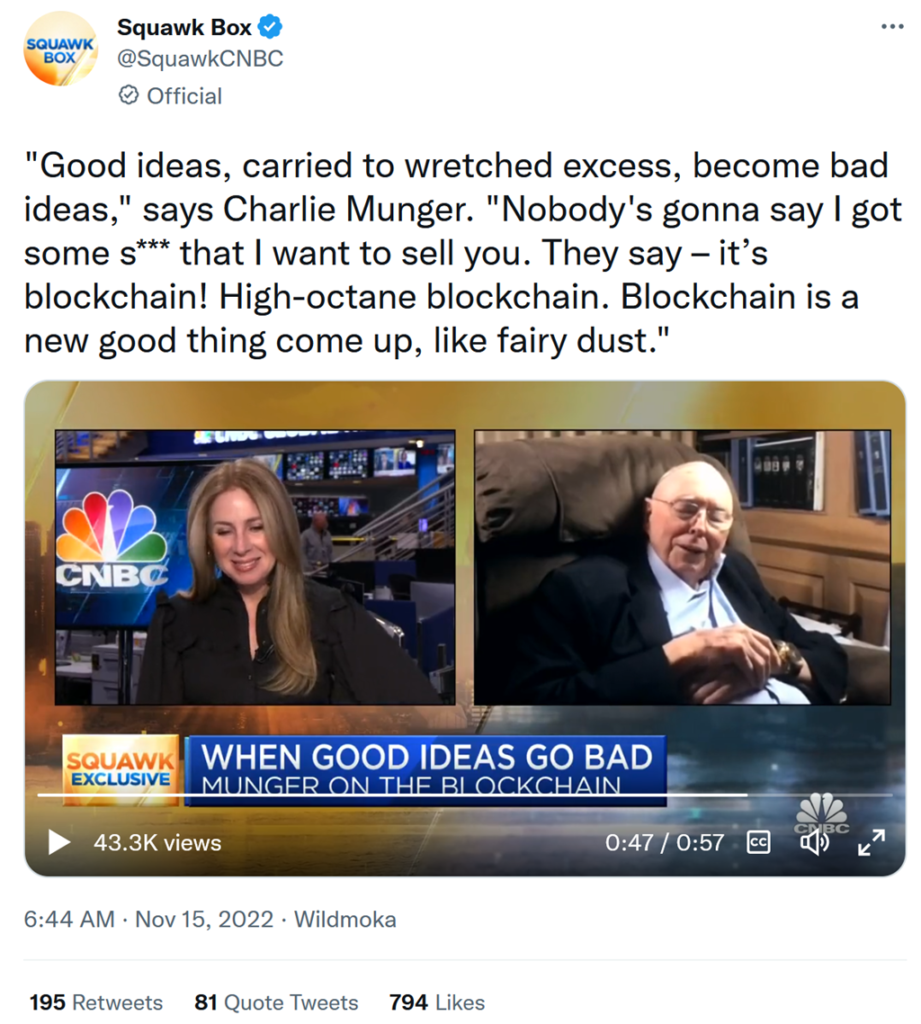Sam Bankman-Fried tries to explain himself; FTX's Bankman-Fried begged for a rescue even as he revealed huge holes in firm's books; New CEO blasts SBF; FTX's Collapse Leaves Employees Sick With Anger; Caroline Ellison; Memes; Charlie Munger's victory dance; Why doing extreme sports benefits me as an investor
1) I am rarely at a loss for words, so instead I'll share a friend's comments on this interview (in writing) that disgraced fraudster Sam Bankman-Fried ("SBF") of now-bankrupt crypto entities FTX and Alameda Research did with Vox:
It's literally the most incredible, unhinged, psychotic, crazy thing I've ever read. There are so many layers of fraud here.
Also, see the Wall Street Journal article today on SBF's co-worker throwing up when he found out they were a fraud.
Meanwhile, SBF is like, "Well, if I could have just raised $8 billion, I could have kept the Ponzi scheme going and made customers whole."
Here's the article by Vox writer Kelsey Piper, based on an hour of back-and-forth direct messages she had with SBF on Tuesday: Sam Bankman-Fried tries to explain himself. Excerpt:
Last night, Sam Bankman-Fried DMed me on Twitter.
That was surprising. I'd spoken to Bankman-Fried via Zoom earlier in the summer when I was working on a profile of him, so I reached out to him via DM on November 13, after news broke that his cryptocurrency exchange had collapsed, with billions in customer deposits apparently gone. I didn't expect him to respond – typically, people under investigation by both the Securities and Exchange Commission and the Department of Justice don't return requests for comment.
Bankman-Fried, though, apparently wanted to talk. About how FTX and his hedge fund Alameda Research had gambled with customer money without, he claims, realizing that's what they were doing. About who gets lauded as a hero and who's the fall guy. About regulators. ("F**k regulators.") About what he regrets ("Chapter 11," the decision to declare bankruptcy) and about what he would have done differently with FTX and Alameda ("more careful accounting + offboard Alameda from FTX once FTX could live on its own").
It was past midnight Bahamas time, where Bankman-Fried is reportedly still located, and we went back and forth on Twitter for more than an hour. He was, he said, still working to try to raise the funding needed to pay back all his depositors.
As we messaged, I was trying to make sense of what, behind the PR and the charitable donations and the lobbying, Bankman-Fried actually believes about what's right and what's wrong – and especially the ethics of what he did and the industry he worked in. Looming over our whole conversation was the fact that people who trusted him have lost their savings, and that he's done incalculable damage to everything he proclaimed only a few weeks ago to care about. The grief and pain he has caused is immense, and I came away from our conversation appalled by much of what he said. But if these mistakes haunted him, he largely didn't show it.
Read this and tell me he's not a sociopath:
This interview is such a mind-boggling act of self-immolation – Bernie Madoff's cell is waiting for him – that Piper messaged him yesterday to make sure his account hadn't been hacked:
This morning, I emailed Bankman-Fried to confirm he had access to his Twitter account and this conversation had been with him. "Still me, not hacked! We talked last night," he answered.
His lawyers did not return a request for comment.
I'll bet they didn't!
2) This Reuters story is almost as damning: FTX's Bankman-Fried begged for a rescue even as he revealed huge holes in firm's books. Excerpt:
Some details of what happened at FTX have already emerged: Reuters reported Bankman-Fried secretly used $10 billion in customer funds to prop up his trading business, for instance, and that at least $1 billion of those deposits had vanished.
Now, a review of dozens of company documents and interviews with current and former executives and investors provide the most comprehensive picture so far of how Bankman-Fried, the 30-year-old son of Stanford University professors, became one of the richest men in the world in just a couple of years, then came crashing down.
The documents, reported here for the first time, include financial statements, business updates, company messages and letters to investors. They, along with the interviews, reveal that:
- In presentations to investors, some of the same assets appeared simultaneously on the balance sheets of FTX and of Bankman-Fried's trading firm, Alameda Research – despite claims by FTX that Alameda operated independently.
- One of Bankman-Fried's close aides tweaked FTX's accounting software. This enabled Bankman-Fried to hide the transfer of customer money from FTX to Alameda. A screenshot of FTX's bookkeeping system showed that even after the massive customer withdrawals, some $10 billion in deposits remained, plus a surplus of $1.5 billion. This led employees to believe wrongly that FTX was on a solid financial footing.
- FTX made about $400 million in "software royalty" payments to Alameda over the years. Alameda used the funds to buy FTX's digital coin FTT, reducing supply of the coin and supporting its price.
- In the second quarter of this year, FTX posted a $161 million loss. Bankman-Fried, meanwhile, had spent some $2 billion on acquisitions.
- As Bankman-Fried tried to rescue FTX in its frantic final days, he sought emergency investments from financial behemoths in Saudi Arabia and Japan – and was joined at his Bahamas headquarters by his law professor father.
Bankman-Fried told Reuters in an email that due to a "confusing internal account," Alameda's leverage was substantially higher than he believed it was.
3) The CEO who replaced SBF, John Ray, is scathing in today's bankruptcy filing – he says it's worse than Enron!
I have over 40 years of legal and restructuring experience. I have been the Chief Restructuring Officer or Chief Executive Officer in several of the largest corporate failures in history. I have supervised situations involving allegations of criminal activity and malfeasance (Enron). I have supervised situations involving novel financial structures (Enron and Residential Capital) and cross-border asset recovery and maximization (Nortel and Overseas Shipholding). Nearly every situation in which I have been involved has been characterized by defects of some sort in internal controls, regulatory compliance, human resources, and systems integrity
Never in my career have I seen such a complete failure of corporate controls and such a complete absence of trustworthy financial information as occurred here. From compromised systems integrity and faulty regulatory oversight abroad, to the concentration of control in the hands of a very small group of inexperienced, unsophisticated, and potentially compromised individuals, this situation is unprecedented.
4) It appears that all but three of FTX's employees were in the dark about SBF's massive fraud: FTX's Collapse Leaves Employees Sick With Anger. Excerpt:
One FTX executive vomited when he learned that the crypto exchange was missing billions of dollars of customer money. A company lawyer quit via a harsh text message to then-Chief Executive Sam Bankman-Fried. A top salesman who had bet big on FTX equity saw most of his wealth evaporate overnight.
What started as a dream job turned into a nightmare for employees of FTX, the crypto exchange that imploded in spectacular fashion last week. The Wall Street Journal spoke to more than a dozen current and former employees, many of whom said they were stunned by FTX's swift demise and shocked by the alleged misuse of customer funds.
For its roughly 300 staffers, FTX seemed like an opportunity to reap financial rewards at one of the world's fastest-growing cryptocurrency firms while fulfilling a sense of moral mission. Mr. Bankman-Fried pledged to give 1% of the exchange's fee revenue to charity, and he appeared to be a paragon of ethics in an industry plagued by scams.
Then it collapsed with lightning speed...
Ryan Salame, co-chief executive of the exchange's Bahamas-based unit FTX Digital Markets, told people close to him that he became physically sick and threw up when he became aware of FTX's problems early last week, the people said. Although he worked closely with Mr. Bankman-Fried, Mr. Salame wasn't part of the inner circle around FTX's leader, the people said...
A friend of Mr. Friedberg's who had dinner with him the day he quit said the attorney – previously a big admirer of Mr. Bankman-Fried – was visibly shaken.
Mr. Friedberg showed this friend the text message he sent to Mr. Bankman-Fried and other top FTX executives submitting his resignation. In the message, the friend recalled, Mr. Friedberg described himself as devastated and said: "One day I hope I can forgive you."
There's a good lesson here for all employees: don't invest all (or even most) of your savings in the company you work for, because if it encounters difficulties – as most companies do at some point – you risk a double whammy: losing your job and your savings at the same time:
The implosion of FTX was financially ruinous for some employees. Outside the U.S., many staff were paid via direct deposit to their accounts on the cryptocurrency exchange, so when FTX froze customer withdrawals last week, these employees couldn't access their funds, people familiar with the matter said.
"You have to understand just how devastated the average FTX employee was," said Nathaniel Whittemore, a former FTX marketing specialist who quit last week. "Not only did it seem they might be out of job, but they also were potentially facing the total loss of their savings. All I could think of was rage and white-hot anger."
It was also common for employees to hold FTX equity or get part of their pay in the exchange's FTT tokens, the people said. Last fall, Mr. Bankman-Fried offered employees the opportunity to buy shares in FTX at a 50% discount to what venture capitalists had paid in a recent funding round, the people said. Now, that equity is worthless and the price of FTT has crashed 90% since the start of November.
Mr. Tackett – who continued to tweet updates to FTX customers last week even after quitting his sales job – said he had lost 80% of his net worth in the collapse. "I kept nearly all my money on FTX," he told the Journal.
5) In last Wednesday's e-mail, as the scandal was unfolding, I wrote about FTX's crypto token, FTT, saying that "I confidently predict will soon be at zero." At the time, it was around $4. This morning, it was around $1.50...
6) You simply cannot make this stuff up! Watch this 39-second video of SBF's ex-girlfriend, 28-year-old Caroline Ellison, who was CEO of Alameda Research:
7) There are a lot of funny memes floating around, like this:
8) Gotta love Charlie Munger doing a victory dance:
9) Following up on my recent e-mails about the 24-hour World's Toughest Mudder I ran last weekend – where I did 65 miles and 200-plus obstacles, finishing second in my age group (see my Facebook posts here and here), I think pushing myself to my limits like this benefits me as an investor for a number of reasons...
First, do you want to know why Berkshire Hathaway (BRK-B) CEO Warren Buffett is one of the richest people in the world? In part, of course, it's that he's compounded money at a high rate. But most people don't fully appreciate the equally important second part of the equation: He's done it for a long period of time.
Buffett started investing when he was only a boy – and is still going strong today at 92! He's accumulated the vast majority of his wealth since he turned 70 – an age at which most people have retired (the life expectancy of the average American man is only 77 years).
I want to keep investing and building wealth in my 70s, 80s, 90s, and even 100s. That's not crazy: Based on my diet, fitness, and other aspects of my life, a life expectancy calculator predicts that I'm going to live to 104!
In addition, being a successful investor requires real mental toughness and resilience...
There will certainly be periods – which can sometimes last for years – in which many stocks in your portfolio run against you and your overall performance is poor.
When this happens (like this year), will you get emotional and panic, making a bad situation worse? Or carefully evaluate the situation and take the right steps to turn things around?
The last years before I closed my hedge funds in 2017 were extremely difficult. I was out of step with the bull market, so my funds, while profitable, underperformed, which led me to feel enormous stress.
It would have been easy to become emotional and start investing rashly to get out of the hole I was in, which undoubtedly would have worsened my situation. Remember the first rule of holes: When you're in one, stop digging!
But I stayed mentally strong and avoided many of the traps I could have fallen into, in part, I believe, because I had sought out adversity and overcome it.
Best regards,
Whitney
P.S. I welcome your feedback at WTDfeedback@empirefinancialresearch.com.





